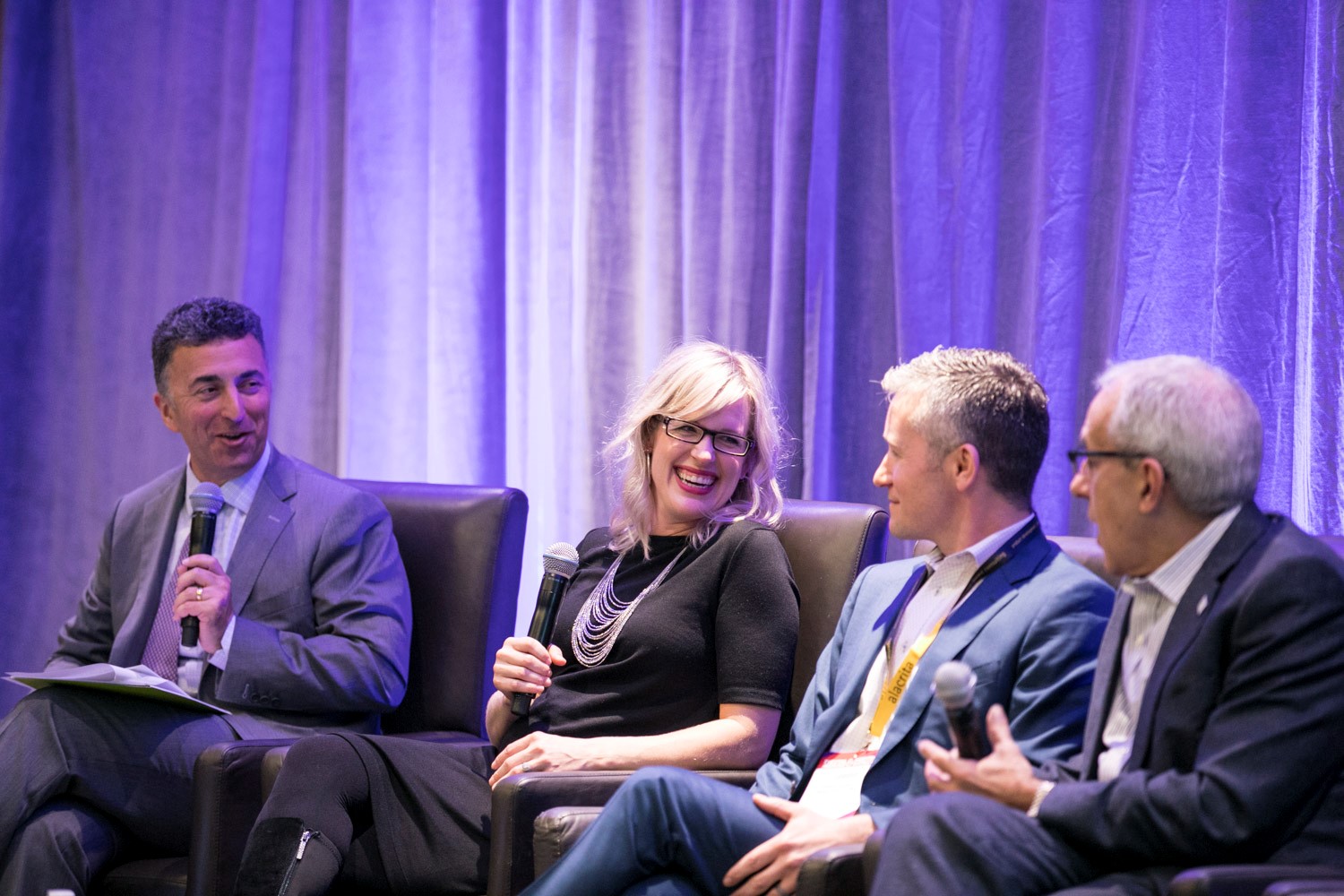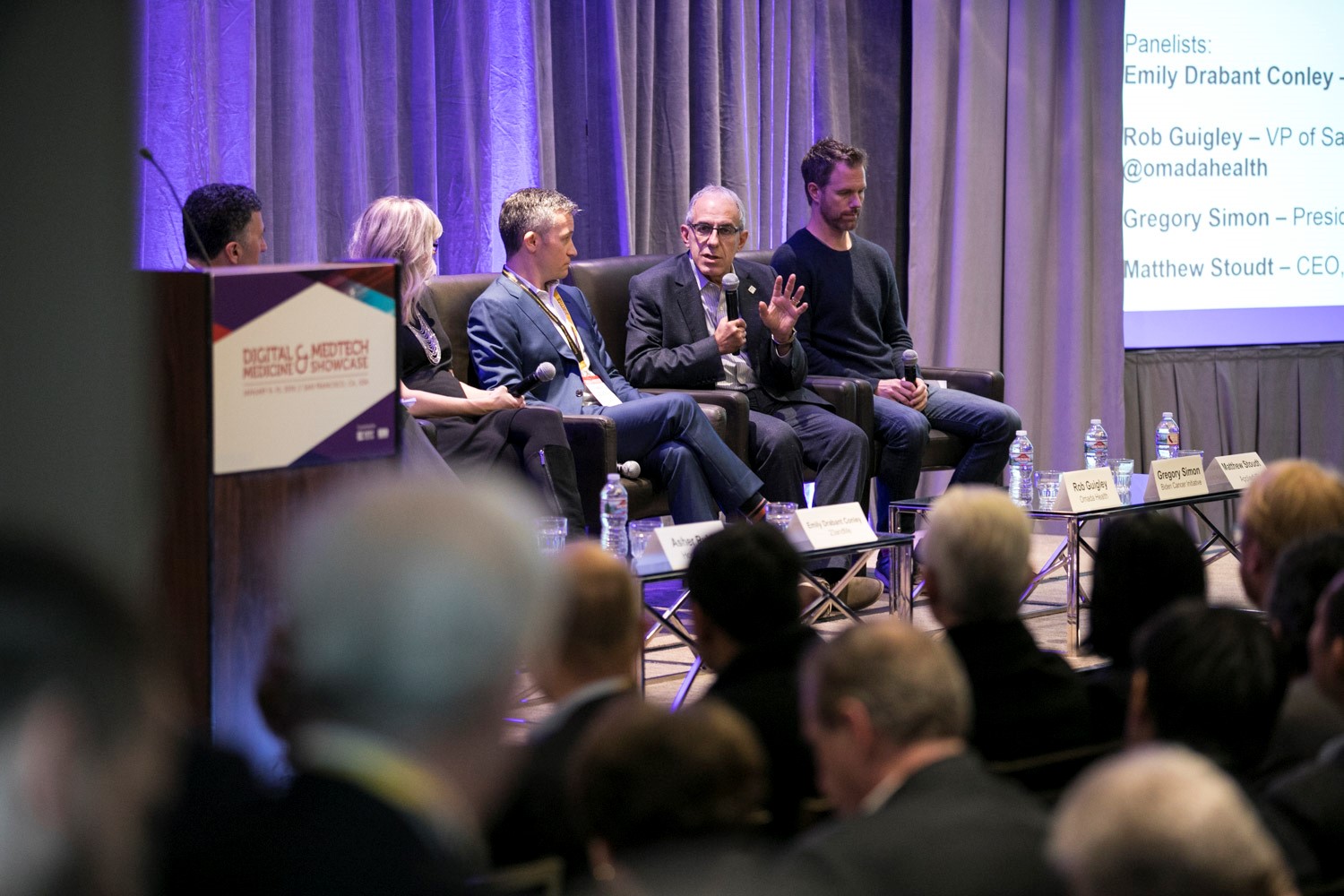A good compound or a good medical device is no longer enough. In addition to that, companies need strong collaborations with patients. Panelists speaking during the “Strange Bedfellows” session at Digital Medicine & Medtech Showcase January 8 in San Francisco are convinced that means a digital connection.
They’re not talking about fitness trackers and similar apps, but about real, digital therapeutics that can increase adherence, reduce patients’ need for opioids or other interventions, build vast sets of patient data, or simply help patients get important health information in a timely fashion.
The Biden Cancer Initiative, for example, is developing digital solutions to find people in crisis who have been diagnosed with cancer or who just lost a loved one to cancer, to reach out quickly and therefore improve their care. “Before, it had been hard to find those people,” Gregory Simon, president of the Biden Cancer Initiative, recalls.
That organization is building a cancer roadmap to help newly diagnosed patients navigate their cancer journey. It provides insights on subsequent cancers that may develop, what patients need to know about specific cancers and, as Simon says, “how not to go broke.”
23andMe’s crowdsourcing approach, now approved by the FDA, goes directly to consumers to provide information and ask them to participate in research. With a client base of 1.2 million people (80 percent of whom have agreed to participate in research), and more than 345 million phenotypic data points, the company is creating vast data sets that have supported more than 70 academic collaborations.
 “People can understand genetics,” Emily Drabant Conley, VP, business development, 23andMe, says. By providing genetic information directly to consumers, 23andMe can empower people and prevent some from becoming patients by alerting them to risks so they can take action.
“People can understand genetics,” Emily Drabant Conley, VP, business development, 23andMe, says. By providing genetic information directly to consumers, 23andMe can empower people and prevent some from becoming patients by alerting them to risks so they can take action.
Likewise, virtual reality apps have the potential to make a huge contribution to the opioid epidemic by training patients to use other techniques to reduce acute and chronic pain.
System is ill-equipped for digital solutions
Despite its potential, today’s healthcare system isn’t equipped to deal with digital medicine. Third party payers often aren’t willing to pay for the information, and for individuals to pay, the information must be valuable and affordable.
For healthcare providers, digital health solutions literally drive away customers. Consequently, they have no strong incentive to accept digital medicine. Increasing the transparency of the healthcare system inevitably will cause incentives to align with patients’ interests.
Strange bedfellows or good business?
Realizing that digital therapeutics are unlike anything that’s come before, biotech companies are building collaborations beyond their norm.
Omada Health, for example, invests energy into payer relations. With an ROI of eight months, its solution is attracting employers as well as insurers and pharmaceutical companies. The goal is not just to reduce costs, but to create an ecosystem around care delivery that increases adherence and attention to care. That includes mechanisms for patients to get rapid, actionable feedback regarding laboratory information, says Rob Guigley, VP of sales, health and reimbursement.
 23andMe’s therapeutic division is partnering with the Milken Institute in a 25,000 person study to understand the genetic signatures of depression and biopolar disorder. The study was enrolled in only a few months and will collect data for one year. The company also has collaborations with Pfizer, Stanford University, and Procter and Gamble, among others.
23andMe’s therapeutic division is partnering with the Milken Institute in a 25,000 person study to understand the genetic signatures of depression and biopolar disorder. The study was enrolled in only a few months and will collect data for one year. The company also has collaborations with Pfizer, Stanford University, and Procter and Gamble, among others.
The Biden Cancer Initiative put together more than 70 partnerships in 2016, sometimes playing matchmaker. Simon cites a George Washington University program that wanted to use social media to fight tobacco addiction in the District of Columbia, and another at Case Western Reserve University that wanted to study the science of public addictions. After Simon introduced the two, a national program resulted.
The most challenging relationships, Simon says, are within academia. “There are no incentives for the researchers to collaborate, and they have little trust of one another’s data.” To overcome this hurdle, the Initiative is building a program around data standards and is working to change the way people are rewarded in terms of reputational credits.
Among other noteworthy alliances, panelists count the Million Person Medicine Project that aims to gather records and sequencing data from one million individuals, the Broad Institute’s Count Me In project for metastatic breast cancer patients and the FDA digital health accelerator program that includes IT and big pharma.
“We have a lot of work to do to create the raw material to understand the human condition,” Simon says. Strange bedfellows, in the form of fresh collaborations, will undoubtedly speed the process.
The panel was moderated by Asher Rubin, global head of life sciences and healthcare at Hogan Lovells, and also included panelist Matthew Stoudt, CEO of AppliedVR.
Want to read more highlights? Click here to read more all of our Biotech Showcase coverage!

